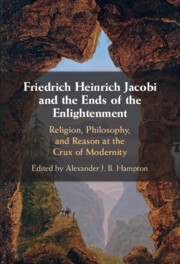 Friedrich Heinrich Jacobi and the Ends of the Enlightenment
Friedrich Heinrich Jacobi and the Ends of the Enlightenment Book contents
- Friedrich Heinrich Jacobi and the Ends of the Enlightenment
- Reviews
- Friedrich Heinrich Jacobi and the Ends of the Enlightenment
- Copyright page
- Dedication
- Epigraph
- Contents
- Contributors
- Foreword
- Acknowledgments
- Abbreviations
- Introduction
- Part I The Critique of Reason: Debates on Rationalism, Empiricism, and Skepticism
- 1 Jacobi and Philosophy
- 2 Jacobi and Spinoza
- 3 Jacobi on the Nature of Mind and Intuitive Certainty
- 4 Jacobi and Kant
- Part II Faith and Revelation: Debates on Theism, Atheism, and Nihilism
- Part III Jacobi and the Revival of Socraticism: The Muenster Circle and Existentialism
- Part IV Jacobi’s Impact on Idealism and Romanticism
- Jacobi Sources
- Index
- References
4 - Jacobi and Kant
Freedom, Reason, Faith
from Part I - The Critique of Reason: Debates on Rationalism, Empiricism, and Skepticism
Published online by Cambridge University Press: 09 February 2023
- Friedrich Heinrich Jacobi and the Ends of the Enlightenment
- Reviews
- Friedrich Heinrich Jacobi and the Ends of the Enlightenment
- Copyright page
- Dedication
- Epigraph
- Contents
- Contributors
- Foreword
- Acknowledgments
- Abbreviations
- Introduction
- Part I The Critique of Reason: Debates on Rationalism, Empiricism, and Skepticism
- 1 Jacobi and Philosophy
- 2 Jacobi and Spinoza
- 3 Jacobi on the Nature of Mind and Intuitive Certainty
- 4 Jacobi and Kant
- Part II Faith and Revelation: Debates on Theism, Atheism, and Nihilism
- Part III Jacobi and the Revival of Socraticism: The Muenster Circle and Existentialism
- Part IV Jacobi’s Impact on Idealism and Romanticism
- Jacobi Sources
- Index
- References
Summary
Jacobi argues that although Spinoza produced the most consistent rational system, its complete rational explanation leads to fatalism, mechanism, and atheism. The concern in this chapter is with how Jacobi stimulates Kant on issues of faith in relation to autonomy and practical reason (ethics), and how Kant’s “moral faith” seeks to avoid the pitfalls of mechanism while integrally linking faith with reason.
- Type
- Chapter
- Information
- Friedrich Heinrich Jacobi and the Ends of the EnlightenmentReligion, Philosophy, and Reason at the Crux of Modernity, pp. 66 - 84Publisher: Cambridge University PressPrint publication year: 2023


